Digital Marketing Basics for Small Businesses
Due to its global reach, digital marketing has become such an unignorable force in today’s business landscape. The evolution of modern technologies that affect day-to-day business operations and the emergence of social media platforms have leveled the playing field for small and medium businesses to remain competitive against larger counterparts.
In an age where people are becoming increasingly connected, marketing has evolved into more than just the promotion of products and services. It is now about building a strong digital presence that’s consistent with the company brand. The days of heavy marketing spending are long gone as companies are focusing more on providing value to attract existing customers and potential clients rather than pushing products and services out.
But what exactly is digital marketing?
Digital marketing is an ever-changing sub-discipline of marketing that refers to a person or a business’s online marketing efforts. Hubspot defines digital marketing as a tool that businesses utilize to connect with current and prospective customers. Marketing strategies such as Search Engine Optimization (SEO), email marketing, social media management, and content marketing all fall under the digital marketing umbrella.
With so many users online, small businesses are starting to recognize the significance of digital marketing as the best way to reach a broader audience with the option of targeting specific buyer segments. A report by Ecommerce Platforms in 2018 found that B2B (business to business) e-commerce sales are expected to outgrow B2C (business to consumer) sales by the year 2020.

Popular among small businesses
Known to offer great returns, digital marketing works well for businesses with a limited budget. If there’s one thing about digital marketing that keeps small businesses compete against larger competitors is its ability to be scalable. This means that no matter how abundant or limited your budget is, digital marketing provides you with multiple ways to attract the interest of potential leads. In doing so, you create a genuine relationship that provides value for both parties.
Multiple tools and channels
Digital marketing is a broad discipline, to say the least. Small businesses have a multitude of options at their disposal that they can mix and match to determine which strategies suit them best. These include different online marketing methods to maximize the lifespan of marketing strategies thus increasing marketing mileage. These methods can work independently as well as work to complement each other. For instance, your social media campaigns could also be tied up with your blog efforts (content marketing) and your blogs could also be promoted through email (email marketing). This creates a unified branding initiative that users will more than likely remember and interact with.
Nowadays, in order to stay competitive, a small business must utilize the abundance of different marketing tools and channels. Small business doing most of its core business functions online needs to understand and embrace that digital marketing is the best way to attract and stay engaged with customers as well as leads.
Content Marketing
Content marketing is a digital marketing strategy that revolves around the development of content with the main intention of stimulating interest to a company’s identity and its products and services. According to the Content Marketing Institute, content marketing is a strategic marketing approach focused on creating and distributing valuable, relevant, and consistent content to attract and retain a clearly defined audience. In simpler terms, content marketing is the development of client-facing content that aims to pique the interest of existing and potential clients.

Search Engine Optimization (SEO)
SEO is the practice of optimizing a website (and all its pages) to rank higher in search engines and increase the quantity and quality of its visitors. In order to rank higher in search engines such as Google, Bing, or Yahoo– a company must spend time learning about the manner with which existing and potential customers search for the products and services they need.
One important thing that most companies forget when developing an SEO strategy is localization. If your business operates through targeting local (city-based and/or state-based), national, and international customers, it is imperative to have marketing approaches for every buyer segment. Also, do not forget to list your business on local listings as well as claim your business on review sites. This gives your business more channels for online visibility thus bolstering your online presence. Localizing your SEO efforts increases your chance of finding potential leads within your area and ensure that your business ranks high in local search engine searches.
Email Marketing
Email marketing, a component of digital marketing, is the use of email to build a relationship with leads, inform current customers, and update contacts about new brand promotions, events, and other company offerings. Think of it as an upgraded and more cost-efficient version of snail mail.
A report by Data Marketing & Analytics in 2015 claims that email has an average ROI (return on investment) of $38 for every dollar spent. This means that email is still one of the most, if not the most, reliable tools out there as it continues to deliver a strong performance for companies. Email is also used by over 90% of businesses and provides a cost-efficient and timely way for companies to communicate with their customers.
Social Media
Social media refers to an all-encompassing term for various online communication tools that allow people to network and interact. The success of social media efforts is due to the quality of interaction and engagement between a company and its followers. Companies are now coming to the realization that social media isn’t only about having a huge following, but also the quality of engagement that the brand receives.
This bodes well for smaller businesses that are unable to spend a large number of resources on paid social ads. Social media serves as a platform that allows small businesses to compete with larger companies and does not depend on how much money a company can spend but on the quality of engagement that companies acquire from social media followers.
As small businesses tend to be more localized and community-focused, social media is the perfect tool to foster a closer connection with your community. The best thing about social media? Aside from the fact that you can succeed through organic marketing efforts, social media is easily the easiest marketing strategy to integrate with other marketing strategies. This means that social media can work hand-in-hand with email marketing and content marketing among others.
Leveraging These Tools
Start with your website
In this day and age, websites have evolved into something more than just aesthetic layouts and interactive graphics. Websites are now one of the most important client-facing tools that directly affect a company’s bottom line. The significance of a company’s website extends to every facet of its digital marketing strategies. As such, your website must contain comprehensive information about your company as well as your products and services.
Localize your efforts
The localization of marketing efforts, also known as location-based marketing or geo-targeting, is the practice of researching and analyzing a targeted region and optimizing marketing efforts based on consumer behaviour and purchasing habits. This means that your content should be tailored to match what existing and potential customers are interested in as well as the keywords that they use to search for products and services. Localizing your marketing efforts will give you an overview of how your customers search for your product in different cities, states, or even countries.
Try, try, and try again!
Digital marketing, like anything that happens in business, is not failproof. For most companies, digital marketing is mostly about trial and error. However, measuring the possible outcomes from digital marketing strategies minimizes the risk of failure.
Having clear goals that can be measured by realistic KPIs (Key Performance Indicators) is the most important thing to understand when developing a digital marketing strategy. Depending on what type of campaign, whether it be brand awareness or lead generation, KPIs will define the success or failure of your efforts.
The more time spent in creating a viable and agile digital marketing strategy, the better the chances for companies to succeed in online marketing efforts. Digital marketing, through client-centric efforts, allows companies to better understand the behaviour of existing and potential customers. With enough research and strategic planning, companies will be able to effectively target high-quality leads without breaking the bank.









